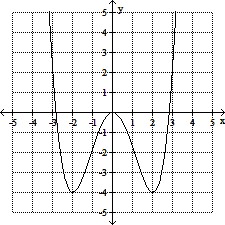If n(A?B) = 29, n(A?B) = 3, and n(A) = 15 find n(B).
a. 14
b. 17
c. 44
d. 26
b. 17
You might also like to view...
Divide.-8 ÷ 
A. 
B. 1
C. 64
D. -64
Solve the problem.The total sales in dollars of some small businesses fluctuates according to the equation  , where x is the time in months, with
, where x is the time in months, with  corresponding to January,
corresponding to January,  , and
, and  Determine the month with the least sales and give the sales in that month.
Determine the month with the least sales and give the sales in that month.
A. December; $6500 B. June; $3900 C. September; $2600 D. March; $10,400
Solve the problem using your calculator.Ten students in a graduate program were randomly selected. Their grade point averages (GPAs) when they entered the program were between 3.5 and 4.0. The following data were obtained regarding their GPAs on entering the program versus their current GPAs. Use linear regression to find a linear function that predicts a student's current GPA as a function of his or her entering GPA. Entering GPA Current GPA 3.5 3.6 3.8 3.7 3.6 3.9 3.6 3.6 3.5 3.9 3.9 3.8 4.0 3.7 3.9 3.9 3.5 3.8 3.7 4.0
A. y = 5.81 + 0.497x B. y = 4.91 + 0.0212x C. y = 3.67 + 0.0313x D. y = 2.51 + 0.329x
Determine any local or absolute extrema as indicated.Use the graph of f to estimate the absolute extrema.
A. Absolute maximum: 0; absolute minima: -2 and 2 B. Absolute maximum: ?; absolute minima: -2 and 2 C. Absolute maximum: ?; absolute minimum: -4 D. No absolute maximum; absolute minimum: -4